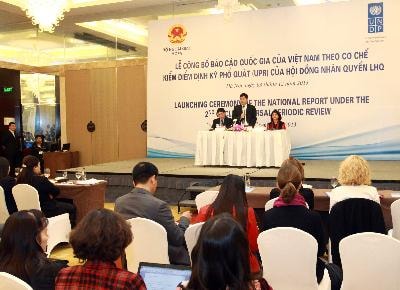Vietnam attends UPR cycle II at the UN Human Rights Council
From February 2 to 9, Deputy Foreign Minister Ha Kim Ngoc will lead an interdisciplinary delegation of Vietnam to attend the national report defense session under the Universal Periodic Review (UPR) cycle II of the United Nations Human Rights Council in Geneva, Switzerland.
Fulfilling human rights obligations and commitments
The Universal Periodic Review (UPR) is a new intergovernmental mechanism of the Human Rights Council tasked with conducting a comprehensive review of human rights issues in all United Nations member states; every four or five years according to the principles of dialogue, cooperation, equal treatment, objectivity, transparency, constructiveness, non-confrontation, non-selectivity and non-politicization.
 |
| On December 3, 2013, in Hanoi, the Ministry of Foreign Affairs coordinated with the United Nations Development Program in Vietnam to organize the Ceremony to Announce Vietnam's National Report under the Universal Periodic Review (UPR) cycle 2 of the United Nations Human Rights Council. Photo: VNA |
The goal of the UPR mechanism is to improve the human rights situation and promote countries to fully implement their human rights obligations and commitments; and to strengthen countries' capacity to implement human rights through consultation, technical assistance and experience sharing.
The Human Rights Council establishes a Working Group on the UPR, chaired by the President of the Human Rights Council, with participation from all UN Member States. Other components (international organizations, national human rights institutions, non-governmental organizations) are allowed to attend as observers but cannot speak.
During the review process, three official documents are considered, including: National Report (no more than 20 pages) prepared by the reviewing State; Document synthesizing comments, assessments, and recommendations (including comments from relevant States) of specialized agencies and mechanisms of the United Nations; Document synthesizing information from other components including national human rights institutions, non-governmental organizations, research institutes, scholars, individuals, etc. These two synthesizing documents are prepared by the Office of the High Commissioner for Human Rights and each document is no more than 10 pages long.
Each member country has a review period of 3.5 hours, in the form of an interactive dialogue, in which the reviewing country has 70 minutes to present its report, answer questions and comments from other countries. Member countries and observers have 10 minutes to comment, ask questions and make recommendations to the reviewed country.
All interested countries are invited to speak and the speaking time (140 minutes) is divided equally among the registered countries. After 48 hours from the review session, the UPR Working Group will meet and adopt the report on the results of the country's review. This report will be submitted to the Human Rights Council for consideration and adoption at the regular session of the Human Rights Council approximately 5 months after the review session.
Vietnam's participation
Vietnam officially submitted its National Report on the implementation of human rights in Vietnam under the Universal Periodic Review mechanism to the Human Rights Council Secretariat on October 31, 2013. The review session on Vietnam will take place on February 5, 2014 in Geneva and the session to adopt the review results will take place on February 7, 2014.
The Vietnamese delegation participated in the UPR Report Defense Session II to highlight Vietnam's policies, efforts and achievements in the cause of comprehensive national renewal, promoting democracy and ensuring human rights; promoting open and sincere foreign relations in the spirit of constructive cooperation with all countries, including on differences, to enhance mutual understanding, and at the same time being ready to share good experiences in ensuring human rights.
Vietnam first implemented the UPR mechanism in May 2009 and received 123 recommendations, of which 96 were accepted. The remaining recommendations were not accepted because they were not suitable to the specific circumstances and conditions of Vietnam. The Prime Minister assigned the implementation of the approved UPR recommendations directly to 17 ministries, branches and government agencies to implement the assigned recommendations.
Implementation of UPR recommendations is clearly demonstrated in all aspects of social life such as: perfecting the legal system and policies on human rights, eliminating hunger and reducing poverty, developing sustainable economy, ensuring social security, creating jobs, improving the quality of education and health care, ensuring basic freedoms of people, and ensuring the rights of vulnerable groups in society.
In the National Report under the UPR mechanism cycle II, Vietnam actively drafted with the participation of 18 ministries, sectors and relevant agencies of the Government and the National Assembly. The content of the report focuses on the implementation of UPR recommendations that Vietnam has accepted and new developments in ensuring human rights in Vietnam, while also pointing out the remaining challenges and the Government's priorities in ensuring human rights.
The drafting process also had the active and widespread participation of political and social organizations representing all classes and communities, domestic and foreign non-governmental organizations, mass media as well as the direct participation of all interested people.
According to Tintuc

.png)






